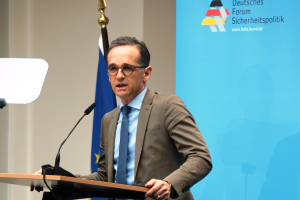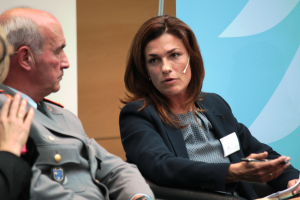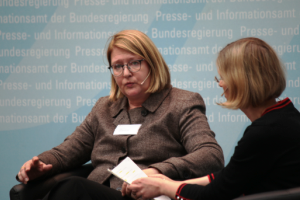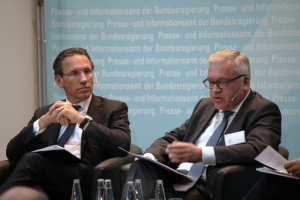Cyber attacks, Brexit and doubts about the transatlantic partnership: Europe is faced with a myriad of security policy challenges. The German Forum on Security Policy 2018 was an occasion for high-ranking representatives from politics, government agencies and society to discuss the prospects of closer cooperation within the EU. At the beginning of the forum, German Foreign Minister Heiko Maas demanded: “We finally have to make Europe fit for foreign policy!”

Foreign Minister Heiko Maas called on Europe to take more effective action in international politics.
Picture: BAKS/Dähnrich.
“Our current German interests have a name: Europe,” said Foreign Minister Heiko Maas at the German Forum on Security Policy kick-off. He added that in his opinion “peace and security” in Europe’s neighborhood today were “under a threat that has not been as serious for a long time.” The minister mentioned the conflicts in Syria, Libya and Yemen, Russia’s violations of international law in Ukraine and “the withdrawal from international agreements by even the closest allies.” According to Maas, “the entire rules-based international order is at stake,” which is why he argued that all the more so Europe needed to take coherent and joint action to bring its international influence to bear. The minister demanded: “We finally have to make Europe fit for foreign policy.”
Foreign Minister Maas calls for a Europe that is fit for foreign policy
How to enhance Europe’s capacity to act in foreign policy and the role Germany could play in this context were the central issues discussed at the German Forum on Security Policy 2018 titled “Rethinking Europe’s Security!” “We never expected the situation to become as critical as it is,” said the President of the Federal Academy for Security Policy (BAKS), Dr Karl Heinz Kamp, with regard to the current debate on Brexit, EU migration policy and cyber attacks all over Europe. Kamp added that the forum intended to contribute to the understanding of such “difficult matters” and encourage dialog on some inconvenient issues of foreign and security policy in Europe. He went on that in doing so it was not about “pointing out the mistakes of others,” given that certain German actions, e.g. in refugee policy or economic and financial policy, were perceived as selfish by some European partners, too. This is another subject to be openly discussed at the German Forum on Security Policy. For the first time, the most important BAKS specialist conference was held at the Press and Information Office of the Federal Government this year – in the immediate vicinity of the political arena right in the center of Berlin.
Proposals for a European Security Council and majority voting in the EU

State Secretary Judit Varga of Hungary in conversation with Lieutenant General Hans-Werner Wiermann. Picture: BAKS/Dähnrich.
Minister Maas explained that the establishment of a “European Security Council” was an important step toward boosting Europe’s capacity to act. On behalf of the entire union, a small group of alternating EU member states would sit on such a panel to more intensively deal with and solve current crises faster. The minister moreover argued in favor of majority voting in the Common Foreign and Security Policy of the EU: “Without abandoning the principle of unanimity such an institution will be unable to solve the problems we face.” In the discussion that followed, Dr Daniela Schwarzer, the director of the German Foreign Policy Association, could only agree with the minister: An EU Security Council is apt “to encourage a common situational understanding.”
State Secretary of Hungary: no unity without diversity
A common situational understanding is indispensable, as in a Europe of currently 28 countries, there will always be diverging perceptions about what kind of threats Europe is facing and how they should be dealt with. Judit Varga, Hungary’s State Secretary for EU relations, said that this was obvious when she explained Hungarian asylum policy and a more pragmatic position toward Russia on the podium. “There will be no unity without diversity,” the State Secretary said. Franziska Brantner, a member of the Bundestag for the Green Party (Bündnis 90/Die Grünen), came back to this in the discussion but at the same time emphasized the importance of common liberal-democratic values, particularly when representing the union externally. “Pragmatic but not naive,“ was Brantner’s assessment of the conflict between cooperation with Russia and protection from Russia’s influence.
A common strategic culture – just wishful thinking?

An arc of crisis: Europe’s security is faced with many challenges – live visualization by graphic recorder Malte von Tiesenhausen. Picture: BAKS/Dähnrich.
A united Europe would be more important now than it has been for a long time. There is a shift in global power structures and the 16+1 cooperation forum between China and 16 Eastern European countries brought this change to Europe quite some time ago. Professor Dr Sven Biscop of the Brussels Egmont Institute for International Studies said that in the triangle between China, Russia and the United States, Europe “had to relearn independent strategic thinking.” Dr Daniela Schwarzer, the director of the German Foreign Policy Association, pointed out how difficult this could turn out to be: “You can always wish for a common strategic culture but this is not what you will get.” According to her, the best possible result for Europe would be to develop a “common understanding for the differences.” Then it might be possible to learn how to deal with them.
France and Germany could lead the way
In spite of all that, European security policy is no lost cause. Dr Jörg Kukies, State Secretary at the Federal Ministry of Finance, considers Emmanuel Macron’s presidency a “once-in-a-lifetime opportunity” for French-German defense cooperation. Schwarzer and Biscop also argued that France and Germany should lead the way. In his speech, Minister Maas had already stated that real progress could “only be achieved in concert with all soon-to-be 27 EU member states.” Tangible proposals as to what this progress could look like abounded. Maas mentioned the European Defense Fund, which is currently being negotiated in Brussels, and described Permanent Structured Cooperation (PESCO), which was initiated in 2017, as “a military breakthrough.” At the same time, he emphasized that this was only one element: “It is equally important to finally make progress in the civilian sphere.”
New impetus for civilian crisis management

Antje Leendertse of the Federal Foreign Office explained new instruments of civilian crisis prevention. Picture: BAKS/Dähnrich.
In the discussion that followed, Siemtje Möller, a member of the Bundestag for the Social Democratic Party (SPD), underlined the importance of civilian crisis prevention. At the same time, Möller pointed out that she was in close contact with the German Armed Forces (Bundeswehr), which are very present in her electoral district, and that in these conversations the situation and the future orientation of the armed forces always played an important role. With regard to the debate on European security policy, she argued to always consider civilian options for action first. Antje Leendertse, Political Director at the Federal Foreign Office, outlined what these options might look like in the future. In the event of a crisis, so-called “stabilizing pilots,” who are part of a small civilian EU reconnaissance unit that is always on standby, could quickly and flexibly compile situation pictures on the ground – something that otherwise required the formation of such a team by other organizations. As Minister Maas before her, Leendertse also argued in favor of the establishment of a European Center of Excellence for Civilian Crisis Management. Such a center could help develop a common understanding, e.g. among police, judicial and administrative staff, before civilian personnel from different EU member countries is sent abroad.
United States: “Atmospheric disturbances”, functional working level
In this context, the difference between the security policy dimension of the EU and of NATO became particularly clear. Especially the military officers attending saw a need for clarification of this issue. Lieutenant General Hans-Werner Wiermann, who represents Germany in the NATO and EU Military Committees, said that the common European security policy “had nothing to do with NATO Article 5 collective defense”. Brigadier General Wolfgang Ohl, Division Chief at the Directorate-General for Security and Defense Policy at the Federal Ministry of Defense, supported this opinion. He pointed out that a mere 20 percent of NATO forces came from EU member countries and added that for this reason it was all the more important to preserve the transatlantic relationship. The panels were mostly optimistic in this regard – participants agreed that NATO continued to uphold alliance solidarity and its capacity to act. In spite of “atmospheric disturbances,” working level relations with the United States are intact, according to General Wiermann. Matthias Naß from the German weekly newspaper DIE ZEIT once more warned not to reduce the United States to Donald Trump. The discussion nevertheless revealed that Trump’s election victory was based on tensions within the society of the United States that will outlast his term of office. Green MP Brantner concluded that for this reason there would be no turning back to the transatlantic status quo ante after Trump.
High expectations of Germany

Dr Jörg Kukies, State Secretary at the Federal Ministry of Finance, (left) and journalist Matthias Naß of DIE ZEIT during the discussion.
Picture: BAKS/Dähnrich.
There are similar wishes for European security policy. Internal tensions, ambiguity with regard to transatlantic relations and global shifts in power call for a joint European response; this has become more than clear during the German Forum on Security Policy. In the face of Brexit, progress is even more urgent and complicated. SPD MP Möller asserted that international expectations of Germany – also on the part of the United States – were high. This is likely to cause mixed feelings in Europe. Naß explained that Germany was faced with a dilemma between expectations on the one hand and fears of dominance on the other. Thus, a common path toward a stronger European security policy is yet to be taken. There was at least one thing all participants could agree on: Europe finally has to be fit for foreign policy.
The German Forum on Security Policy was established in 2013 and meets once a year, bringing together representatives from politics, government agencies and society to discuss current crucial issues of comprehensive security policy in Berlin. In 2018, the event was sponsored by the Association of Friends of the Federal Academy for Security Policy (Freundeskreis der Bundesakademie für Sicherheitspolitik e.V.). In former years, the focus of the conference was on international migration, the financial crisis and globalization.
Authors: Katharina Münster and Sebastian Nieke
